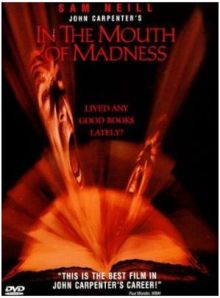 Some may argue that writing is an indulgent enterprise at the least, and a narcissistic one at the most, so it should come as no surprise that writers (myself included) love films about writers. No, it’s not that writer’s block is all that interesting to watch on the silver screen (unless you are Hunter S. Thompson), rather, it’s like looking into a mirror that is facing another mirror. Films about writers offer a double shot of creativity; that which is offered by the writer them self, and that which is offered by the (presumably) fictional writer. Some have gone further still, at least in literature. Stephen King, of whom I am so fond, wrote himself into his epic Dark Tower series, as a character interacting with the story’s leading man, Roland, and his cohorts. You have to have a brass set, and the credentials to back them up to go that far.
Some may argue that writing is an indulgent enterprise at the least, and a narcissistic one at the most, so it should come as no surprise that writers (myself included) love films about writers. No, it’s not that writer’s block is all that interesting to watch on the silver screen (unless you are Hunter S. Thompson), rather, it’s like looking into a mirror that is facing another mirror. Films about writers offer a double shot of creativity; that which is offered by the writer them self, and that which is offered by the (presumably) fictional writer. Some have gone further still, at least in literature. Stephen King, of whom I am so fond, wrote himself into his epic Dark Tower series, as a character interacting with the story’s leading man, Roland, and his cohorts. You have to have a brass set, and the credentials to back them up to go that far.
So, that being said, here are my top ten favorite films about writers.
10 ) In the Mouth of Madness (1994). When famous horror writer, Sutter Cane goes missing, it is up to insurance investigator, John Trent, to locate him on behalf of his publisher. Trent soon discovers that Cane’s writing is more powerful than he could have imagined, and is caught up in a plot that goes from marketing strategy to supernatural rather quickly. Writer has boogey man issues, writer tackles issues through writing, writer makes boogey man come alive with writing.
9 ) Misery (1990). Stephen King has a knack for writing books that translate easily to the screen. Of course, King fans like myself are waiting with bated breath to see the results of The Dark Tower series on which King has collaborated with J.J. Abrams of Lost and Cloverfield (2008). Anyway, Misery is the story of a writer, Paul, who is struggling to complete his latest book. On his way to a winter hideaway, he has a little accident and is rescued by Annie, his “number one fan”. Of course, no good can come of a neurotic fan who lives in seclusion and is especially apt with an axe, now can there?
8 ) Almost Famous (2000). Guilty pleasure alert! What writer wouldn’t want to waste an hour or two watching the adventures of a teenage boy, William, who is hired as a freelance journalist for Rolling Stone? Add famous 1970’s rock band, (in)famous female groupies of the blonde variety, and narcotics, and you’ve got yourself a rockin’ movie.
7 ) Barfly (1987). I have to admit, I only came by this one recently. You’ll have to excuse the delay, considering I was five when this movie was released. But, I am climbing on the Mickey Rourke Comeback Train just like everybody else. Henry doesn’t realize he’s a “writer” per se. In fact, he doesn’t realize much, what with his raging alcoholism. He gets drunk, and the delicate genius is revealed. The best part was this; I know an artist or two who might very well have studied this film and then actually emulated Henry. I am down with the whole troubled artist thing, but…yeah.
6 ) Where the Buffalo Roam (1980). Oh, Hunter, what would we do without you? Gonzo journalism and Hunter S. Thompson at their finest. Football games, hustlers, militia and politics, all done in his signature style, as portrayed by Bill Murray. Of course, Johnny Depp has also played the infamous Hunter S. Thompson, but everybody and their dog has heard of Fear and Loathing, so I play the underdog.
5 ) Capote (2005). Another epic film about a “real-life” writer. Truman Capote is arguably the father of the true crime genre, with the chilling book In Cold Blood being his child. Phillip Seymour Hoffman plays Capote with all of the nuances and neurosis I would have expected, and conveys Capote’s interesting tale well. Two thumbs up and an Oscar to boot.
4 ) Secret Window (2004). This Stephen King page-to-screen adaptation is focused on newly-divorced writer, Mort Rainey, as he encounters a strange man who accuses him of plagiarism. Of course, story stealing is only the beginning of the bad behavior Mort has been up to.
3 ) The Hours (2002). A chick flick for ladies with brains if there ever was one. This riveting movie follows three female lead characters as they engage with Virigina Woolf’s Mrs. Dalloway, including Woolf herself as she writes it. You’ll either be bored, or enthralled, but either way you’ll be in tears.
2 ) Stranger Than Fiction (2006). Harold Crick is your average, boring, middle-aged tax man, until he starts hearing a voice narrating his life. Of course, in another striking example of writer writes, writer makes exist, the narrator is in fact a struggling novelist suffering from a case of writer’s block that can only be cured by killing off the story’s character, Harold. With this film, Will Ferrell proved that he can actually act, instead of just act funny. Plus, I am an absolute sucker for a dark comedy.
1 ) The Basketball Diaries (1995). I have watched this film so many times, I can recite the script. Leonardo DiCaprio portrays Jim Carroll, a kid growing up in New York, and scribbling in a composition book in between shooting hoops and shooting up. Before James Frey there was Jim Carroll.
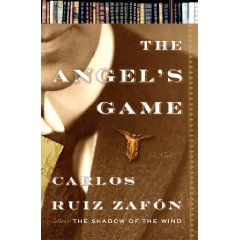 I picked up The Angel’s Game by Carlos Ruiz Zafon last week after a colleague recommended it, and settled in, somewhat skeptically, to give a new writer (by new, I mean one I had not read previously) a fair shot. It had been described to me as a dark mystery by a writer who Stephen King recently raved about. And as one of King’s Constant Readers, I trust his word more than I’d trust that of any clergyman.
I picked up The Angel’s Game by Carlos Ruiz Zafon last week after a colleague recommended it, and settled in, somewhat skeptically, to give a new writer (by new, I mean one I had not read previously) a fair shot. It had been described to me as a dark mystery by a writer who Stephen King recently raved about. And as one of King’s Constant Readers, I trust his word more than I’d trust that of any clergyman.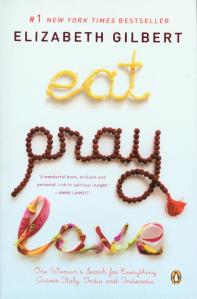 Does anyone else cringe when they hear the term “chick lit”? I always thought it was a term that was thrown around in book reviews to define material written by and for women, but behold, “chick lit” is an entire genre, like horror, that agents and publishers recognize. And, it just won’t go away. Take Eat, Pray, Love by Elizabeth Gilbert for example. Despite the book being published in 2006, it seems to still be lurking in the media, and setting the standard by which all women writers are being compared.
Does anyone else cringe when they hear the term “chick lit”? I always thought it was a term that was thrown around in book reviews to define material written by and for women, but behold, “chick lit” is an entire genre, like horror, that agents and publishers recognize. And, it just won’t go away. Take Eat, Pray, Love by Elizabeth Gilbert for example. Despite the book being published in 2006, it seems to still be lurking in the media, and setting the standard by which all women writers are being compared.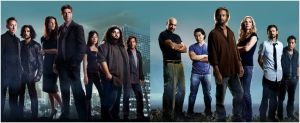 When the first episode of Lost aired, and we met John Locke, I phoned my mother and told her that I was already on to something. The name, John Locke, was significant because in the year before, I had taken a course on political philosophy and had read John Locke. And, for the next couple of seasons I was left wondering if that was a coincidence or not (I highly suspected not). Then we meet Jeremy Bentham, and my suspicions were confirmed; John Locke’s character is based on early policitical philosophers who discussed such issues as the social contract and utilitarianism (the greatest good for the greatest number and so forth…). It made perfect sense.
When the first episode of Lost aired, and we met John Locke, I phoned my mother and told her that I was already on to something. The name, John Locke, was significant because in the year before, I had taken a course on political philosophy and had read John Locke. And, for the next couple of seasons I was left wondering if that was a coincidence or not (I highly suspected not). Then we meet Jeremy Bentham, and my suspicions were confirmed; John Locke’s character is based on early policitical philosophers who discussed such issues as the social contract and utilitarianism (the greatest good for the greatest number and so forth…). It made perfect sense.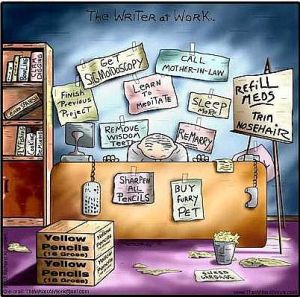 Writer’s Block. That terrible, ever-lurking antithesis to “the flow” of which writers speak is a very real thing. To someone who does not write extensively, it may seem easy to cast the notion off as silly, and inextricably linked to ego, but in reality, it can interupt a writer’s work and frustrate the bejesus out of them. Flow, on the other hand, is that glorious pace a writer can find where the words seem to come from the fingers (or pen) first and the mind later. It’s a constant race to keep up with yourself before the next moment flutters out of your mind like a butterfly and is lost forever. This can last four hours before the writer is broken from the trance and brought back to the reality of dinner that must be made, day jobs that must be worked, and bills that must be paid.
Writer’s Block. That terrible, ever-lurking antithesis to “the flow” of which writers speak is a very real thing. To someone who does not write extensively, it may seem easy to cast the notion off as silly, and inextricably linked to ego, but in reality, it can interupt a writer’s work and frustrate the bejesus out of them. Flow, on the other hand, is that glorious pace a writer can find where the words seem to come from the fingers (or pen) first and the mind later. It’s a constant race to keep up with yourself before the next moment flutters out of your mind like a butterfly and is lost forever. This can last four hours before the writer is broken from the trance and brought back to the reality of dinner that must be made, day jobs that must be worked, and bills that must be paid. Some may argue that writing is an indulgent enterprise at the least, and a narcissistic one at the most, so it should come as no surprise that writers (myself included) love films about writers. No, it’s not that writer’s block is all that interesting to watch on the silver screen (unless you are Hunter S. Thompson), rather, it’s like looking into a mirror that is facing another mirror. Films about writers offer a double shot of creativity; that which is offered by the writer them self, and that which is offered by the (presumably) fictional writer. Some have gone further still, at least in literature. Stephen King, of whom I am so fond, wrote himself into his epic Dark Tower series, as a character interacting with the story’s leading man, Roland, and his cohorts. You have to have a brass set, and the credentials to back them up to go that far.
Some may argue that writing is an indulgent enterprise at the least, and a narcissistic one at the most, so it should come as no surprise that writers (myself included) love films about writers. No, it’s not that writer’s block is all that interesting to watch on the silver screen (unless you are Hunter S. Thompson), rather, it’s like looking into a mirror that is facing another mirror. Films about writers offer a double shot of creativity; that which is offered by the writer them self, and that which is offered by the (presumably) fictional writer. Some have gone further still, at least in literature. Stephen King, of whom I am so fond, wrote himself into his epic Dark Tower series, as a character interacting with the story’s leading man, Roland, and his cohorts. You have to have a brass set, and the credentials to back them up to go that far.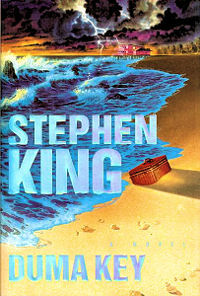 I must admit up front that it is tremendously difficult for me to NOT like Stephen King’s writing. From the time I read Gerald’s Game at the age of thirteen (I highly doubt that 13 year olds were the target market for that particular book…), I was hooked. Since then I could be considered what Mr. King refers to often as Constant Reader.
I must admit up front that it is tremendously difficult for me to NOT like Stephen King’s writing. From the time I read Gerald’s Game at the age of thirteen (I highly doubt that 13 year olds were the target market for that particular book…), I was hooked. Since then I could be considered what Mr. King refers to often as Constant Reader.